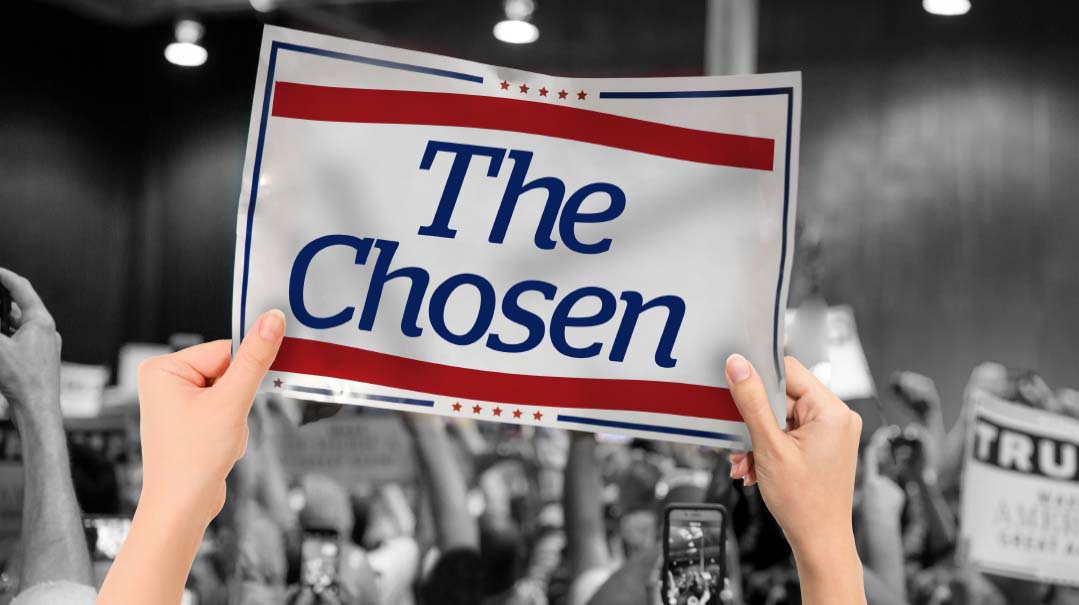The Chosen

She was demanding. But didn’t I owe it to her campaign?

Low-pitched and slow, Fiona McGlocklin, the campaign manager, had stressed in the meeting she’d held with us volunteers. My palms are wet as I make my first call for the evening.
“Hi, this is Dina Berger from Dr. Sylvie Goldfeder’s campaign headquarters,” I begin as soon as someone picks up, hoping my voice isn’t cracking.
The life-size banners of Dr. Goldfeder with former President Bush strung across the tent catch my eye. “Dr. Goldfeder for Mayor” is printed across the top of each one. I feel a surge of energy giving me the courage to push past my shyness. I believe in the cause.
“I want to invite you to a rally Dr. Goldfeder will be holding next Friday morning. Outside the main shopping center on Cobbler Avenue. Dr. Goldfeder will be speaking.”
“On Friday morning?”
“Yes,” I answer smoothly. “That way you don’t have to come out especially. You’re probably doing your Shabbos shopping then.”
The man laughs. “Very considerate. That’s Dr. Goldfeder for you.”
I jump into that opening. “Exactly! That’s why it’s so important to come out and vote. We really need someone like her in office. Someone who cares about the community, and isn’t just in it for the publicity…”
The man on the phone gives a low whistle. “I’ll try to make it. Thanks for calling.”
I hang up with a sigh of relief. I really dislike cold calling. But this call had gone pretty well. I flash a thumbs-up at Rochie, sitting in the row in front of me, and move on to the next name.
A woman answers with a curt hello. I quickly launch into my prepared speech.
“Dr. Sylvie Goldfeder?” The woman’s voice sounds disparaging.
“Right.”
“So that’s the story,” the woman says.
“Excuse me?”
“We used to be neighbors. And friends. Then all of a sudden, whenever she’s out and about, she’s surrounded by a group of women, like they’re her bodyguards, and she can’t even say hello. Got all hoity toity now that she’s running for mayor, I suppose?”
The silence is awkward. I mentally rush to Dr. Goldfeder’s defense. How petty! Whenever I bump into Dr. Goldfeder in shul, at simchahs, even shopping on Cobbler Avenue, she always greets me and asks after my mother.
My mother has multiple sclerosis, and Dr. Goldfeder has always been there for our family. When we first moved to Connecticut, way back when I was in fourth grade, my parents renovated the house to make it handicap accessible, not realizing they needed a permit. They’d been slapped with a huge fine they had no way of paying. Someone had introduced them to Dr. Goldfeder, who was already a lawyer and activist, and she’d taken on the case pro-bono, managing not only to have the fine rescinded, but getting the city to pay my parents compensation too.
Since then, Dr. Goldfeder has been a larger-than-life presence in my house. When I’d mentioned one Friday night that I’d signed up as a volunteer for her mayoral campaign, Mommy had knocked over her soda glass in delight. And my father’s lined face broke out in a smile that actually reached his eyes.
The woman on the line breaks the silent standoff. “Thanks for calling.” Then she mutters something indecipherable and hangs up.
I take off my headset and wipe my palms on my denim skirt.
Rochie heads over to me. “How’s it going, Dina?” We’ve been friends for years, and she knows how shy I am.
“Not bad,” I answer. But this last call has left me uneasy. “Two down, twenty-eight more to go.”
Rochie laughs and goes back to her computer.
Our shift finishes at midnight, and Rochie and I perch on the low, red brick wall outside Dr. Goldfeder’s law offices.
Rochie tosses me a can of Dr. Pepper she bought from the vending machine set up in a corner of the tent, and I gratefully sip the cold soda.
“You’d think they’d provide us with free refreshments,” Rochie grumbles as she sits down next to me. “These cans were two dollars each.”
My stomach rumbles. I pop open an oversize bag of Bissli for us to share. I’d come straight from college and hadn’t had time to eat supper.
“Remind me to ask, what’s the campaign manager assistant’s name, the one always walking around making notes on her clipboard?”
“Aliza."
“Right, Aliza. Remind me to ask her to organize refreshments,” Rochie says and crunches on her last Bissli.
Something in me clenches in protest. We’re here to help, not to be wined and dined! But I have a feeling Rochie won’t like hearing that, so I keep quiet and brush the crumbs off my skirt as we head to the car.
Oops! We could not locate your form.






